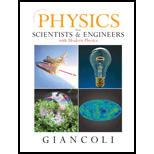
Physics for Scientists and Engineers with Modern Physics
4th Edition
ISBN: 9780131495081
Author: Douglas C. Giancoli
Publisher: Addison-Wesley
expand_more
expand_more
format_list_bulleted
Concept explainers
Question
Chapter 41, Problem 31P
(a)
To determine
The daughter nucleus.
(b)
To determine
The
Expert Solution & Answer
Want to see the full answer?
Check out a sample textbook solution
Students have asked these similar questions
How do we calculate the resistance of R1, R3, and R4?
ew it now.
S)
Search
Khan Academy
Donate Megan
NGSS.HS: HS-PS2-1, HS-PS2.A.1
Google Classroom
Microsoft Teams
Identify the true statements.
2
Choose all answers that apply:
A
If an object is accelerating, it must be experiencing a nonzero ΣF
If an object is remaining at rest, it must be experiencing zero ΣỄ
If an object is moving, it must be experiencing a nonzero ΣỄ
Q Search
Related content
Newton's First Low
Newton's first law
C2 of 4
Skip
Y!mobile 4G
10:51 PM
43%
Messenger
cdn.fbsbx.com
Done
FLUID- is substance whose shape can easily change and is able to flow. Offer little resistance to change in shape when
Rothe gases and liquids are fluids.
11 of 12 fmolecules that randomly arranged and held together by weak cohesive forces and by forces exert-
ainer.
On pages 209-221 of the General Physics 1 textbook, read and analyze the key concepts, equations and problem
solving strategies of Fluid Mechanics.
IV. SIMPLE ACTIVITY
Activity 1
Directions: Read, analyze and solve the problem below. Show your complete solution then box your final answer.
A uniform silver sphere and a uniform gold sphere have the same mass. What is the ratio of the radius of the silver
sphere to the radius of the gold sphere?
Activity 2
Directions: Read, analyze and solve the problem below. Show your complete solution then box your final answer.
Joel watches his fish tank and notices that the angel fish likes to feed at the water's surface, while the…
Chapter 41 Solutions
Physics for Scientists and Engineers with Modern Physics
Ch. 41.2 - Prob. 1AECh. 41.2 - Prob. 1BECh. 41.4 - Prob. 1CECh. 41.8 - Prob. 1DECh. 41.8 - Prob. 1EECh. 41.8 - Prob. 1FECh. 41.8 - Prob. 1GECh. 41 - Prob. 1QCh. 41 - Prob. 2QCh. 41 - Prob. 3Q
Ch. 41 - Prob. 4QCh. 41 - Prob. 5QCh. 41 - How do we know there is such a thing as the strong...Ch. 41 - Prob. 7QCh. 41 - What is the experimental evidence in favor of...Ch. 41 - Prob. 9QCh. 41 - Prob. 10QCh. 41 - Prob. 11QCh. 41 - Prob. 12QCh. 41 - Prob. 13QCh. 41 - Prob. 14QCh. 41 - Prob. 15QCh. 41 - When a nucleus undergoes either or + decay, what...Ch. 41 - Prob. 17QCh. 41 - Prob. 18QCh. 41 - Prob. 19QCh. 41 - Prob. 20QCh. 41 - An isotope has a half-life of one month. After two...Ch. 41 - Prob. 22QCh. 41 - Prob. 23QCh. 41 - Prob. 24QCh. 41 - Prob. 25QCh. 41 - Prob. 26QCh. 41 - Prob. 27QCh. 41 - Prob. 28QCh. 41 - Prob. 1PCh. 41 - Prob. 2PCh. 41 - Prob. 3PCh. 41 - Prob. 4PCh. 41 - Prob. 5PCh. 41 - Prob. 6PCh. 41 - Prob. 7PCh. 41 - Prob. 8PCh. 41 - Prob. 9PCh. 41 - Prob. 10PCh. 41 - Prob. 11PCh. 41 - Prob. 12PCh. 41 - Prob. 13PCh. 41 - Prob. 14PCh. 41 - Prob. 15PCh. 41 - Prob. 16PCh. 41 - Prob. 17PCh. 41 - Prob. 18PCh. 41 - Prob. 19PCh. 41 - Prob. 20PCh. 41 - Prob. 21PCh. 41 - Prob. 22PCh. 41 - Prob. 23PCh. 41 - Prob. 24PCh. 41 - Prob. 25PCh. 41 - Prob. 26PCh. 41 - Prob. 27PCh. 41 - Prob. 28PCh. 41 - Prob. 29PCh. 41 - Prob. 30PCh. 41 - Prob. 31PCh. 41 - Prob. 32PCh. 41 - Prob. 33PCh. 41 - Prob. 34PCh. 41 - Prob. 35PCh. 41 - Prob. 36PCh. 41 - Prob. 37PCh. 41 - Prob. 38PCh. 41 - Prob. 39PCh. 41 - Prob. 40PCh. 41 - Prob. 41PCh. 41 - Prob. 42PCh. 41 - Prob. 43PCh. 41 - Prob. 44PCh. 41 - Prob. 45PCh. 41 - Prob. 46PCh. 41 - Prob. 47PCh. 41 - Prob. 48PCh. 41 - Prob. 49PCh. 41 - Prob. 50PCh. 41 - Prob. 51PCh. 41 - Prob. 52PCh. 41 - Prob. 53PCh. 41 - Prob. 54PCh. 41 - Prob. 55PCh. 41 - Prob. 56PCh. 41 - (II) The activity of a radioactive source...Ch. 41 - Prob. 58PCh. 41 - Prob. 59PCh. 41 - Prob. 60PCh. 41 - Prob. 61PCh. 41 - Prob. 62GPCh. 41 - Prob. 63GPCh. 41 - Prob. 64GPCh. 41 - Prob. 65GPCh. 41 - Prob. 66GPCh. 41 - Prob. 67GPCh. 41 - Prob. 68GPCh. 41 - Prob. 69GPCh. 41 - Prob. 70GPCh. 41 - Prob. 71GPCh. 41 - Prob. 72GPCh. 41 - Prob. 73GPCh. 41 - Prob. 74GPCh. 41 - Prob. 75GPCh. 41 - Prob. 76GPCh. 41 - Prob. 77GPCh. 41 - Prob. 78GPCh. 41 - Prob. 79GPCh. 41 - Prob. 80GPCh. 41 - (a) A 72-gram sample of natural carbon contains...Ch. 41 - Prob. 82GPCh. 41 - Prob. 83GPCh. 41 - Prob. 84GPCh. 41 - Almost all of naturally occurring uranium is...Ch. 41 - Prob. 86GPCh. 41 - Prob. 87GPCh. 41 - Prob. 88GPCh. 41 - Prob. 89GPCh. 41 - Prob. 90GP
Knowledge Booster
Learn more about
Need a deep-dive on the concept behind this application? Look no further. Learn more about this topic, physics and related others by exploring similar questions and additional content below.Similar questions
- No Chatgpt pleasearrow_forwardConsider a pure sample of a radioactive isotope with a mass number of (50). If the sample has mass of (25.0) micrograms and the isotope has a half-life of (17.5)x106 years, determine the decay rate for the sample. Give your answer in decays/second and with 3 significant figures.arrow_forwardA = 13, B = 04, C = 4 A particular radioactive isotope has a half-life of (29.8) years. If the initial amount of the isotope was (28.5) g, how years later will the only (7.20) g remain of this isotope? Give your answer in years and with 3 significant figures.arrow_forward
- A particular radioactive isotope has a half-life of (6.5) hours. If you have (24.5) g of the isotope at 10:00 AM, how much will you have at 7:30PM? Give your answer in grams (g) and with 3 significant figures.arrow_forwardSOLVE STEP BY STEP WITHOUT ARTIFICIAL INTELLIGENCE A ship is located in a certain region of the ocean, conducting research that requires knowledge of the sea depth at that point. To do so, it emits a signal with a wavelength of 40 m and a frequency of 30 Hz. If the signal is detected by the ship's radar 8 seconds later, what is the depth of the sea in that region?arrow_forwardNo Chatgpt please will upvotearrow_forward
- If ur using Chatgpt leave this problem otherwise will downvotearrow_forwardFor the following circuit, consider the resistor values given in the table and that it is powered by a battery having a fem of ε= 10.0 V and internal resistance r= 1.50 Ω. Determine:(a)Equivalent resistance from points a and b.b)Potential difference of EACH of the seven resistors.arrow_forwardANSWER ALL PARTS OF THE QUESTION AND SHOW/EXPLAIN YOUR WORK.arrow_forward
arrow_back_ios
SEE MORE QUESTIONS
arrow_forward_ios
Recommended textbooks for you
 College PhysicsPhysicsISBN:9781938168000Author:Paul Peter Urone, Roger HinrichsPublisher:OpenStax College
College PhysicsPhysicsISBN:9781938168000Author:Paul Peter Urone, Roger HinrichsPublisher:OpenStax College University Physics Volume 3PhysicsISBN:9781938168185Author:William Moebs, Jeff SannyPublisher:OpenStax
University Physics Volume 3PhysicsISBN:9781938168185Author:William Moebs, Jeff SannyPublisher:OpenStax Modern PhysicsPhysicsISBN:9781111794378Author:Raymond A. Serway, Clement J. Moses, Curt A. MoyerPublisher:Cengage Learning
Modern PhysicsPhysicsISBN:9781111794378Author:Raymond A. Serway, Clement J. Moses, Curt A. MoyerPublisher:Cengage Learning Principles of Physics: A Calculus-Based TextPhysicsISBN:9781133104261Author:Raymond A. Serway, John W. JewettPublisher:Cengage Learning
Principles of Physics: A Calculus-Based TextPhysicsISBN:9781133104261Author:Raymond A. Serway, John W. JewettPublisher:Cengage Learning Stars and GalaxiesPhysicsISBN:9781305120785Author:Michael A. Seeds, Dana BackmanPublisher:Cengage Learning
Stars and GalaxiesPhysicsISBN:9781305120785Author:Michael A. Seeds, Dana BackmanPublisher:Cengage Learning Physics for Scientists and Engineers with Modern ...PhysicsISBN:9781337553292Author:Raymond A. Serway, John W. JewettPublisher:Cengage Learning
Physics for Scientists and Engineers with Modern ...PhysicsISBN:9781337553292Author:Raymond A. Serway, John W. JewettPublisher:Cengage Learning

College Physics
Physics
ISBN:9781938168000
Author:Paul Peter Urone, Roger Hinrichs
Publisher:OpenStax College

University Physics Volume 3
Physics
ISBN:9781938168185
Author:William Moebs, Jeff Sanny
Publisher:OpenStax

Modern Physics
Physics
ISBN:9781111794378
Author:Raymond A. Serway, Clement J. Moses, Curt A. Moyer
Publisher:Cengage Learning

Principles of Physics: A Calculus-Based Text
Physics
ISBN:9781133104261
Author:Raymond A. Serway, John W. Jewett
Publisher:Cengage Learning

Stars and Galaxies
Physics
ISBN:9781305120785
Author:Michael A. Seeds, Dana Backman
Publisher:Cengage Learning

Physics for Scientists and Engineers with Modern ...
Physics
ISBN:9781337553292
Author:Raymond A. Serway, John W. Jewett
Publisher:Cengage Learning